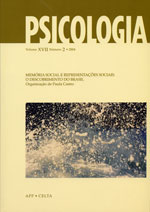Social representations of the discovery of Brazil: Actors and colonization process
DOI:
https://doi.org/10.17575/rpsicol.v17i2.456Keywords:
-Abstract
In the framework of the hypothesis according to which the evocation of remote events anchors in identitarian principles, this paper analyses the social representation (SR) of the discovery of Brazil. Firstly the representation of the actors of the colonization (Portuguese colonisers, native Indians and African slaves) is studied. Secondly, this representation is related with other dimensions of the memory of the discovery of Brazil. Data were collected in the Lisbon area (N=500) and in Rio de Janeiro (N=400) through quota sampling. Results show that national and political identities in Portugal as well as in Brazil are associated with representations of colonization actors. However, when images of the actors are brought together with other dimensions of the colonization consensual representations are founded in Portugal and in Brazil. These SR are consensual in each country but antagonistic between them.


